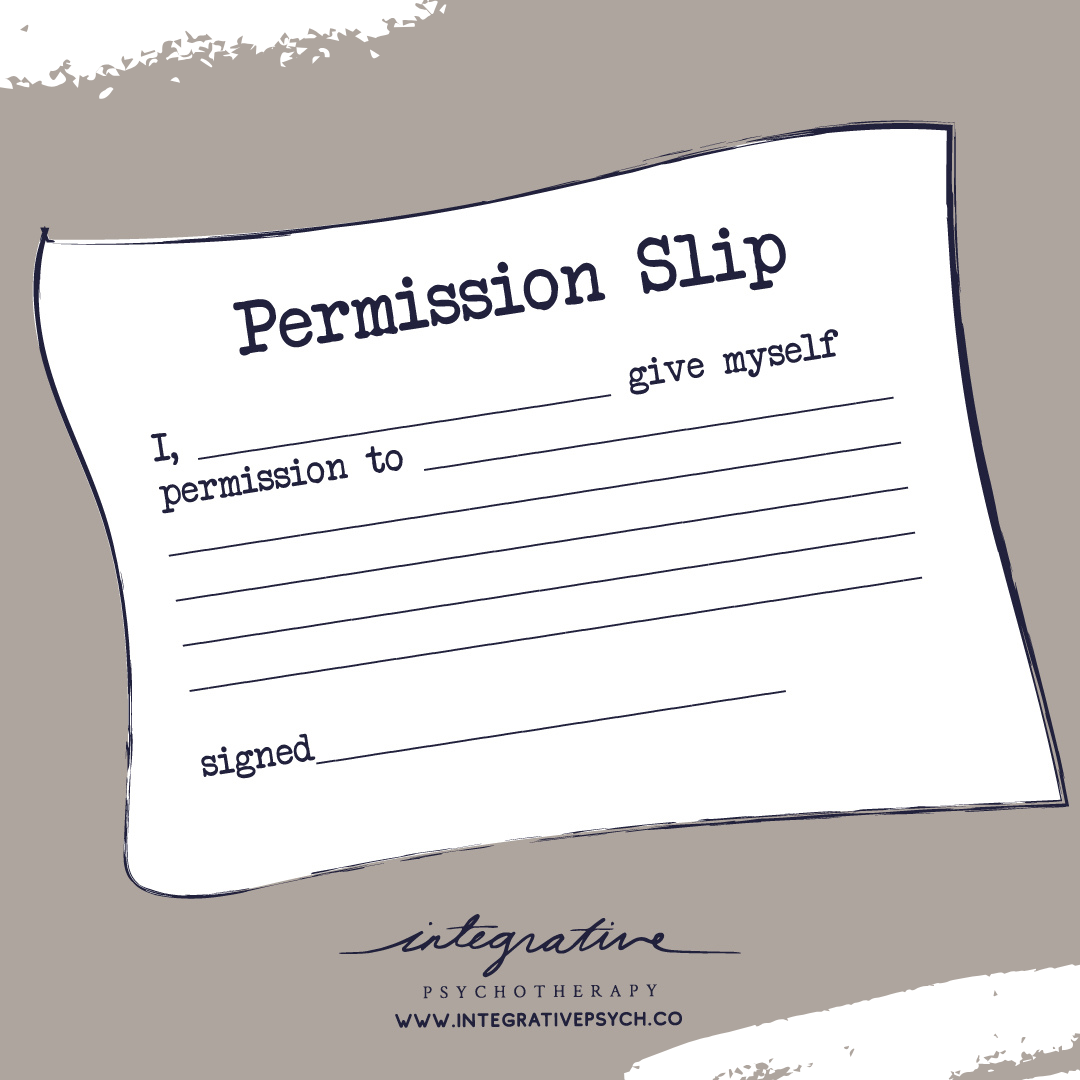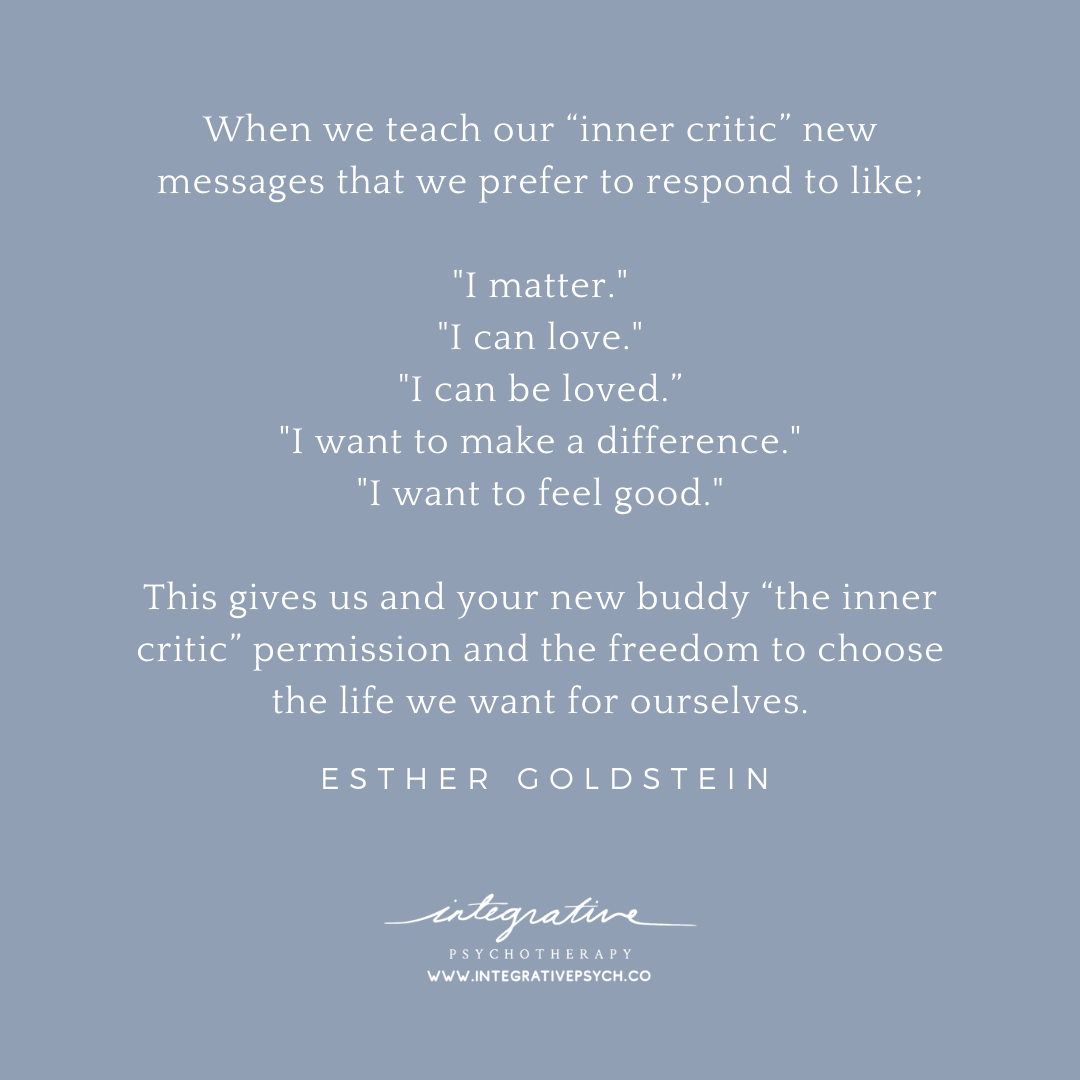"Permission Slips" Holiday Season Series Part 5
It may sound silly, but I actually advise my clients to write themselves “permission slips” regularly.
Many people who feel guilty about everything have a hard time feeling secure in the decisions that they make for themselves.
….they feel bad deciding to go to the gym because they should be volunteering
… they feel bad they are volunteering because they should be home with their kids
… they feel bad about being home with the kids because they need to work more to be able to provide more for their needs
… they feel bad working more because they are not taking care of their health
… vicious cycle? Sure is!
A free pass to choose what you really want to do can take a lot of introspection, self-discovery, and requires some curiosity.
Have you read my blog post from earlier in this series “KNOW YOUR WHY”? Read it!
Essentially, it’s about the ability to prioritize guilt-free (or less-guilty - let’s be real, we are just getting started on our journey to health).
This requires an ability to dig deep inside, in order to identify your core values. This can be very tricky, because your values may be clouded by other people’s expectations of you.
Knowing your why is incredibly important if you want to be able to write your own permission-slips.
In order to make the best choices for you and learn how to feel what you need to feel without feelings of guilt, I highly recommend you go back to that post and do the 5Ws activity at some point if you haven't already.
In the meantime… until you know how to write your own permission slip, allow me to write the first one for you;
You are allowed to not feel ok this season.
Forcing yourself to be “fake” actually makes it feel worse. If you’re struggling... it’s ok. You will move through it with more ease without pushing yourself.
Here is another one for you…
You are allowed to be selfish.
I bet you’re thinking, “Come on Esther, that’s not a very polished thing to say. It’s definitely not a refined statement. And besides, everyone knows that being selfish is bad.”
So, you’re right. I don’t think you need to be a “selfish human being” , but I do think it’ll do you good to practice behaving selfishly once in a while. Selfish is not a dirty word.
We can be selfish in a healthy, kind and nourishing way.
When we are babies, we are born takers.
We can’t give anything to anyone (except cuddles, warm happy feelings, and eventually smiles). As we grow a bit older, we learn how to give and share. If we feel secure, given the proper space to choose when and how to give, we are able to share amply and will generally grow to be generous adults.
If we are forced to share and give to others before we are developmentally ready to fully understand, we might develop feelings of fear, anxiety, resentment, or trauma associated with giving. This is a normal response, given the developmental “gap” that happens by premature forced generosity.
The good news is that we can slowly repair some of that.
The “Good Place”, Life Lessons & Healthy Dosing of Selfishness
When we are able to uncover the roots of our experiences, we can heal them and start to feel safe in both being selfish (in a healthy way) and giving (in a healthy way).
I truly believe we all need to have a healthy dose of selfishness in order to become the sort of person who “shows up”. We need to learn to channel our selfish drive in order to nurture ourselves and grow.
It’s kind of like in Season 3, Episode 8, of The Good Place,“Don’t Let the Good Life Pass You By”. In this episode, Michal and Janet find out that Doug Forcett is the only human in the history of the world who actually figured out the “point system” and is the only one who actually made it to the real good place (heaven).
Everyone else was in the bad place.
When “kindness” is self-neglect
Doug lives “the perfect life”, selflessly giving all of his belongings to charity, eating only radishes and lentils that he grows in his garden and drinks water that he recycles from his excrement.
He tries to be so kind that he allows others to be horrible to him, and adopts every animal that shows up near his house (and he has the scars to prove it). He would literally never hurt a fly - even if it was feeding off of his internal organs. Doug never says no to anything or anyone. He is miserable and alone. Michael and Janet realize that the point system used to evaluate “goodness” makes no sense.
Doug is as lonely and miserable in the eternal after-life as he is on earth. Just because he is selfless, doesn’t mean he is a good person. A good person requires a healthy balance of giving and selfishness. His perfectionism actually doesn’t seem perfect at all.
While this is a joke, and exaggeration to prove a brilliant point, this episode really drives the message home.
Balance is actually much kinder to everyone involved, and creates a healthier environment for all.
We even learn about “Good Selfishness”, which is really just boundaries and balance, in the Torah (bible). The concept of giving a tithe to charity puts limits on our giving. The formula for the average person is 10%. If you are extremely wealthy, the max is 20%. If giving without boundaries was the ideal, the Torah would not have set limits on it.
Cultivating Balance & Your Body as a “Balance-Meter”
Let’s be real. Balance is hard. For most of us, it is a constant struggle to figure it out. But the good news is that our bodies give us so much data and insight once we begin to listen to it.
That pit in your stomach
Your nausea
The lump in your throat
Your migraines
Your chronic back pains
Those butterflies
The muscle tension
The jaw clenching
If you have ruled out any medical issues, any of the above and more can be your body's language telling you what is right and what is wrong for you.
So learn to tune in and listen, and take a bit of the pressure off of yourself.
You can be ambitious and still take care of yourself.
You can be a nice person and still take care of yourself.
You can set boundaries that protect you and your relationships.
Let your body speak to you so you know when enough is enough. You are enough.
Here is your next permission slip;
You are allowed to set whatever boundaries you need in order to have balance in your life (or during the holiday) even if it makes someone else angry.
It’s ok. for people to get frustrated. Healthy ones will stick around. You don’t need to hurt yourself to make others happy.
It’s also ok to say NO.
If this is hard for you, here’s some exposure work.
Practice with me…
NO
NO.
NO!
NO!
How’s that for you?
At first, it might not feel that good. When you are not used to it, it’ll take some time to find the balance of saying no with kindness, compassion and strength
A healthy balance of YES & NO is critical to living your best healthy lifestyle.
It's all about slowing down.
Being present.
Feeling the beauty of time.
It's about developing a buddy buddy relationship with your “inner critic” so you can call it out on it’s BS, not letting it come in the way of living life we want to live; Lives of inner clarity, of direction, of purpose.
Your Inner Critic & A Good Life
Get to know what your “inner critic” looks like and sounds like. It will usually have some go-to messages in your brain “you are nothing” , ”ugh, stop being so sensitive!”, “why are you not more like so and so?”
We don’t want to tell the inner critic to shut up, the same way would not like it if someone told us to shut up. Your “inner critic” has a story that you can uncover with the 5Ws to figure out the origins of it’s messaging.
Once you understand the root of what the go-to messaging is, why it talks like that to you, where & when it learned these negative messages etc, you can literally talk to the “inner critic” with the same compassion that you would want to be talked to and calm it down.
This is much more effective than shoving the feelings deep down inside because it does not allow for any festering.
The Soda Bottle Analogy and Your Inner Critic
Imagine a soda bottle. It has a tight lid on it, so when you shake it up, it will likely not spray all over. But shoving emotions down is like shaking that bottle. The pressure builds and builds each time you shake it.
It’s possible that the bottle will explode on its own after enough shaking… but even if not, some innocent person could walk by and see that bottle sitting there and open it not knowing that all this pressure has built up inside... when they open it, they will definitely get a shower. If we are not in tune with ourselves, we won’t even notice that we were shaking that bottle (aka. Shoving our emotions down).
When we tell the inner critic to shut up and stop being a baby, we are kind of shaking that bottle and shoving the emotions down.
How Listening to your Critic Allows a Shift to Take Place
Listen to the inner critic, and release its concerns in a loving and gentle way. (kind of like if you know the bottle has been shaken, you would slowly let a little air out bit by bit). Address the root of its concerns, and explain why you are ok now and even though you know it cares about you, you’ve got this situation. Listen to the body signals.
When we lower the pressure in this way; we stop comparing ourselves to others, we are more compassionate and giving because we actually want to give, we can live with intention, we can feel liberated and truly content.
This shift in mindset will allow us to take the breaks we so desperately need - except they won’t be desperate anymore because we won’t reach that breaking point. We won’t reach the exploding bottle stage.
Shifting to self-love and self-compassion
When we teach our “inner critic” new messages that we prefer to respond to like
"I matter."
"I can love."
"I can be loved.”
"I want to make a difference."
"I want to feel good."
This gives you and your new buddy “the inner critic” permission and the freedom to choose the life you want for yourself.
And here is my final sample of your permission slips;
You have permission to celebrate this season in a way that is meaningful to you, even if it is not the same as it has always been or the way others expect it to be.
(see my blog post “RESCRIPT & RE-DEFINE” for more on this idea)
I hope something resonates, and at the least, you got to scribble one little permission slip for yourself that you’ll abide by. And if you do, drop a comment below so you can offer some inspiration for some others!
And stay tuned for the next topic called “Winds of Change”, coming up next.





